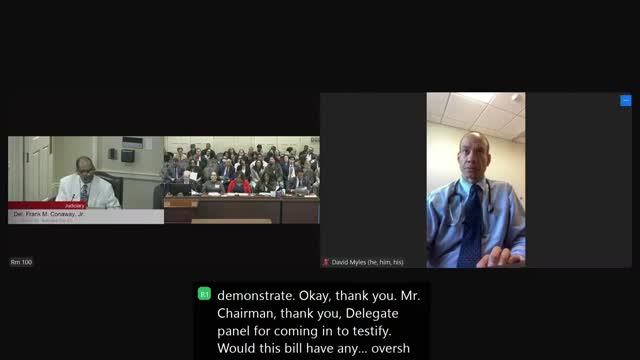Committee hears push to let wrongdoing that prevents witnesses be admitted in certain second-degree assault cases
Get AI-powered insights, summaries, and transcripts
Subscribe
Summary
Supporters asked lawmakers to extend a statutory hearsay exception now used for felonies to second-degree assault, arguing it would let juries hear evidence that a defendant tried to procure a victim—s absence. Opponents warned the change risks Sixth Amendment confrontation problems in misdemeanor bench trials.
House Bill 281 would extend Maryland—s existing statutory exception that allows admission of out-of-court statements when a defendant has "engaged in wrongdoing" to procure a witness—s absence (often cited as rule 5-804(b)(6) practice) to include second-degree assault. That extension would make the exception available in many domestic-violence cases that are prosecuted as misdemeanors.
Proponents, including Montgomery County prosecutor Debbie Feinstein, the Maryland Coalition Against Sexual Assault, Baltimore County domestic-violence service providers and several state's attorneys, said the exception fills a gap when abusers intimidate or persuade victims not to appear. Feinstein and Baltimore County State's Attorney Scott Schellenberg described cases in which jail calls, police body-camera recordings and other evidence showed defendants telling victims not to come to court; prosecutors said without the rule they could not put that context before the finder of fact in misdemeanor matters.
Advocates for victims noted that abusers frequently use threats to prevent testimony and that domestic-violence victims often face pressure, coercion, economic dependence and ongoing contact with the accused. Several victim-service organizations said the rule would let juries see the full pattern of abuse rather than allowing a defendant to benefit from their interference.
Opponents, including the Office of the Public Defender, argued the change would weaken the constitutional right to confront accusers. They noted that district-court adjudications are often bench trials where the judge who decides admissibility may also decide guilt, which raises concerns about bifurcating the judge—s role and applying a low evidentiary preponderance threshold to determine whether wrongdoing to procure the witness occurred. Public defenders also urged attention to alternatives such as witness-intimidation statutes and careful limiting instructions.
Committee members asked about safeguards: how the prosecution would prove the defendant procured the absence, whether a failure to serve a subpoena could qualify, and how recorded statements (for example, police body cameras or doorbell footage) would figure into the test. Witnesses emphasized the statutory standards require proof that the defendant intended and took steps to make the declarant unavailable, not mere administrative failures to serve process.
Lawmakers did not vote during the hearing; witnesses said they were willing to work with the committee on clarifying language and procedural protections for defendants while ensuring the rule's availability where intimidation is proven.
